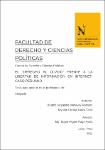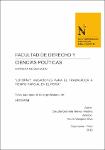Mostrar el registro sencillo del ítem
Propuesta legislativa para la inserción del derecho al olvido en el sistema constitucional peruano 2024
| dc.contributor.advisor | Rosario Pacahuala, Emilio Augusto | |
| dc.contributor.author | Diaz Torres, Cristina Patricia | |
| dc.contributor.author | Navarro Berrospi, Maria Fernanda Nallely | |
| dc.date.accessioned | 2025-03-24T23:10:27Z | |
| dc.date.available | 2025-03-24T23:10:27Z | |
| dc.date.issued | 2024-05-16 | |
| dc.identifier.citation | Diaz, C. P., & Navarro, M. F. (2024). Propuesta legislativa para la inserción del derecho al olvido en el sistema constitucional peruano 2024 [Tesis de licenciatura, Universidad Privada del Norte]. Repositorio de la Universidad Privada del Norte. https://hdl.handle.net/11537/40623 | es_PE |
| dc.identifier.other | 342.0853 DIAZ 2024 | es_PE |
| dc.identifier.uri | https://hdl.handle.net/11537/40623 | |
| dc.description.abstract | La evolución del internet fue un hecho transcendental en la vida cotidiana de las personas, marcando un antes y un después del desarrollo de estas, toda vez que permitió el acceso fácil e inmediato a su información, lo cual muchas veces ha podido lesionar derechos fundamentales como el derecho a la intimidad. Tal es así que, para evitar esta vulneración de derechos, hace un tiempo se habló de un derecho emergente, denominado derecho al olvido, o también conocido como el derecho a las segundas oportunidades. En ese sentido, el principal objetivo de esta investigación fue determinar la importancia de una propuesta legislativa para la inserción del derecho al olvido en el sistema constitucional peruano. En el aspecto metodológico se desarrolló el enfoque cualitativo, a través de entrevistas a especialistas en la materia y análisis documental, a fin de determinar la importancia de legislar el derecho al olvido en el marco constitucional y los beneficios que conllevaría su aplicación. Es así como se concluyó que, pese a que en nuestro país no existió un gran esparcimiento del tema, el derecho al olvido es una facultad del titular para solicitar la eliminación de aquel contenido en la web creada por un tercero o por la misma persona que, por el paso del tiempo, ya no es relevante para los fines que fue publicada, otorgándole al titular la posibilidad de tener una segunda oportunidad en su vida privada. | es_PE |
| dc.description.abstract | The evolution of the internet was a transcendental event in people's daily lives, marking a before and after in their development, since it allowed easy and immediate access to their information, which has often been able to harm fundamental rights such as the right to privacy. So much so that, in order to avoid this violation of rights, some time ago there was talk of an emerging right, called the right to be forgotten, or also known as the right to second chances. In this sense, the main objective of this research was to determine the importance of a legislative proposal for the insertion of the right to be forgotten in the Peruvian constitutional system. In the methodological aspect, the qualitative approach was developed, through interviews with specialists in the field and documentary analysis, in order to determine the importance of legislating the right to be forgotten in the constitutional framework and the benefits that its application would entail. Thus, it was concluded that, despite the fact that in our country there was not a great diffusion of the subject, the right to be forgotten is a right of the owner to request the removal of that content on the website created by a third party or by the same person that, due to the passage of time, is no longer relevant for the purposes for which it was published. giving the holder the possibility of having a second chance at their private life. | es_PE |
| dc.description.uri | Tesis | |
| dc.format | application/pdf | es_PE |
| dc.format | application/msword | es_PE |
| dc.language.iso | spa | es_PE |
| dc.publisher | Universidad Privada del Norte | es_PE |
| dc.rights | info:eu-repo/semantics/openAccess | es_PE |
| dc.rights.uri | https://creativecommons.org/licenses/by-nc-nd/3.0/us/ | * |
| dc.source | Universidad Privada del Norte | es_PE |
| dc.source | Repositorio Institucional - UPN | es_PE |
| dc.subject | Libertad de expresión | es_PE |
| dc.subject | Protección de datos personales | es_PE |
| dc.subject | Derecho a la intimidad | es_PE |
| dc.subject | Derecho al olvido | es_PE |
| dc.subject | Desindexación | es_PE |
| dc.subject | Right to be forgotten | es_PE |
| dc.subject | Freedom of expression | es_PE |
| dc.subject | Protection of personal data | es_PE |
| dc.subject | De-indexing | es_PE |
| dc.title | Propuesta legislativa para la inserción del derecho al olvido en el sistema constitucional peruano 2024 | es_PE |
| dc.type | info:eu-repo/semantics/bachelorThesis | es_PE |
| thesis.degree.grantor | Universidad Privada del Norte. Facultad de Derecho y Ciencias Políticas | es_PE |
| thesis.degree.level | Título Profesional | |
| thesis.degree.discipline | Derecho | es_PE |
| thesis.degree.name | Abogado | es_PE |
| dc.publisher.country | PE | es_PE |
| dc.subject.ocde | https://purl.org/pe-repo/ocde/ford#5.05.01 | es_PE |
| thesis.degree.program | Pregrado | |
| dc.description.sede | Breña | es_PE |
| renati.advisor.dni | 40872575 | |
| renati.advisor.orcid | https://orcid.org/0000-0003-2421-548X | es_PE |
| renati.author.dni | 72896928 | |
| renati.author.dni | 72323193 | |
| renati.discipline | 421016 | es_PE |
| renati.juror | Egocheaga Casas, Hugo | |
| renati.juror | Aliaga Viza, María Estela | |
| renati.juror | Rosario Pacahuala, Emilio Augusto | |
| renati.level | https://purl.org/pe-repo/renati/level#tituloProfesional | es_PE |
| renati.type | https://purl.org/pe-repo/renati/type#tesis | es_PE |
| dc.relation.conformsto | 11% | es_PE |
| dc.description.lineadeinvestigacion | Salud pública y poblaciones vulnerables | es_PE |
| dc.description.sublineadeinvestigacion | El Estado constitucional: control y orden constitucional | es_PE |
Ficheros en el ítem
Este ítem aparece en la(s) siguiente(s) colección(ones)
-
Tesis [170]






